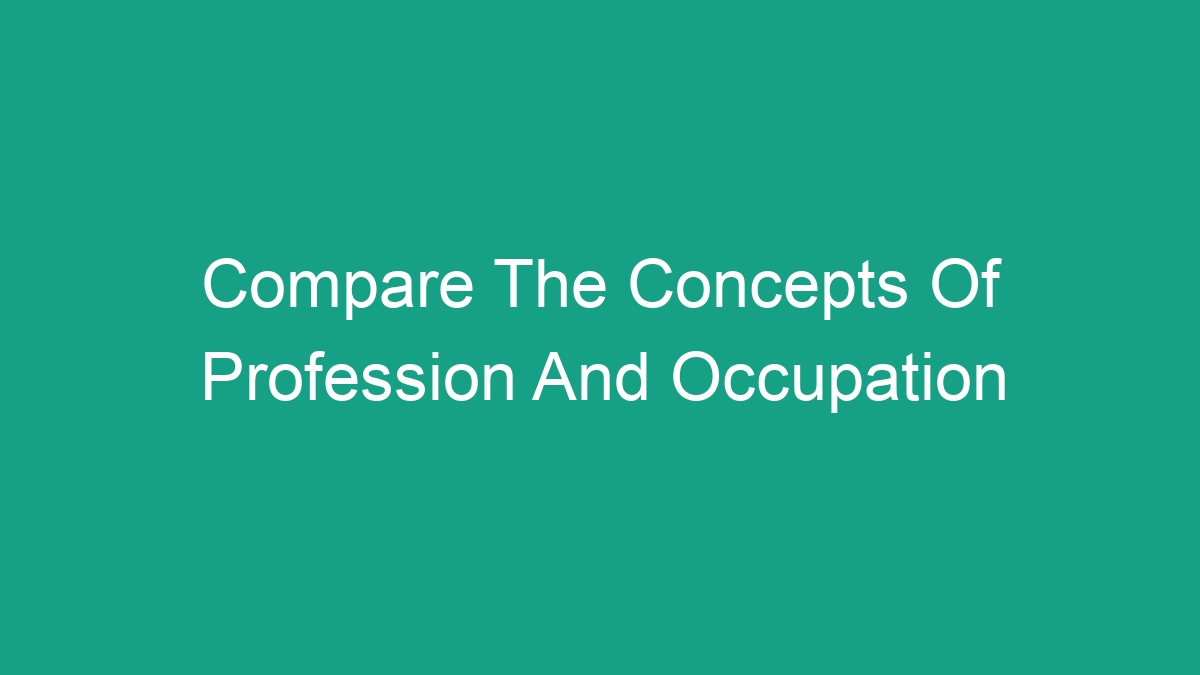
In the professional world, the terms “profession” and “occupation” are often used interchangeably, but they actually have different meanings and implications. Understanding the distinctions between these concepts is crucial for individuals seeking to establish themselves in their chosen field. In this article, we will compare the concepts of profession and occupation, exploring their definitions, characteristics, and significance.
Profession
Definition
A profession refers to a vocation or career that requires specialized training, education, and expertise in a specific area of knowledge. Professionals are typically bound by a code of ethics and are often members of professional bodies or associations that regulate their conduct and standards of practice.
Characteristics
- Specialized Knowledge: Professions require individuals to possess in-depth knowledge and expertise in a particular field, often acquired through formal education and training.
- Ethical Standards: Professionals are expected to adhere to high ethical standards and codes of conduct in their practice, placing the interests of their clients or the public above their own.
- Regulated Practice: Many professions are subject to regulation by government bodies or professional organizations to ensure standards of quality and competence are maintained.
- Ongoing Professional Development: Professionals are expected to engage in continuous learning and development to stay current with advancements in their field.
Occupation
Definition
An occupation refers to a person’s regular work or profession. It encompasses the activities and tasks that an individual engages in to earn a living, regardless of the level of expertise or training required.
Characteristics
- Varied Skill Levels: Occupations can range from unskilled labor to highly specialized roles, with varying levels of training and expertise required.
- Income Generation: Occupations are primarily focused on the generation of income and may not necessarily require a formal education or specialized training.
- Employment Opportunities: Occupations encompass a broad range of employment opportunities, from manual labor to professional roles, catering to different skill sets and interests.
- Flexibility: Individuals may engage in multiple occupations throughout their career, adapting to changing circumstances and opportunities.
Key Differences
While professions and occupations are both related to work and employment, they differ in several key aspects:
- Educational Requirement: Professions typically require formal education, specialized training, and qualifications, whereas occupations may or may not have specific educational requirements.
- Regulation: Professions are often subject to regulatory oversight and professional standards, while occupations may not have the same level of external regulation and oversight.
- Ethical Standards: Professionals are expected to adhere to higher ethical standards and codes of conduct, given the potential impact of their work on others, while occupations may have more varied ethical considerations.
Significance of Understanding the Difference
For Individuals
Understanding the distinction between profession and occupation is crucial for individuals as they navigate their career paths. It allows them to make informed decisions about their education, training, and professional development, aligning with their aspirations and goals.
For Employers
Employers benefit from recognizing the differences between professions and occupations when defining job roles, recruiting, and managing their workforce. It enables them to assess the specific skills and qualifications required for different positions and to establish appropriate professional standards and expectations.
Conclusion
In conclusion, while profession and occupation are related to work and employment, they have distinct meanings and implications. Professions require specialized knowledge, adherence to ethical standards, and often, regulatory oversight, while occupations encompass a broader spectrum of employment opportunities. Understanding the differences between these concepts is essential for individuals and employers in navigating the professional world effectively.
FAQs
Q: Is it possible for an occupation to become a profession?
A: Yes, some occupations may evolve into professions as they require higher levels of expertise, formal education, and regulatory oversight over time.
Q: Can a person have multiple professions?
A: While it is less common, there are instances where individuals may have expertise in multiple distinct fields, qualifying them as professionals in each area.



